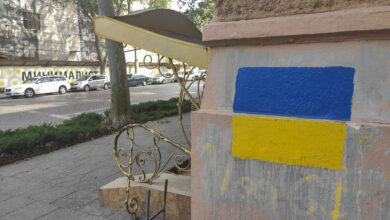Odessa breathes easy as Russian forces contained in Mykolaiv

By María Traspaderne
Odessa, Ukraine, Mar 26 (EFE).- After being terrorized by the first Russian strikes on the city earlier this week without any casualties, Odessa streets are slowly resuming normal life, with some citizens able to overcome the initial fear as the Russian troops have been unable to take over the neigboring city of Mykolaiv.
“We panicking during the first few days, but now people are returning to Odessa. There is even a traffic jam, businesses are reopening, (…) the spring is arriving,” city mayor Petr Obukhov told EFE, although adding that they were also prepared for the “worst case scenario.”
One has to pass through dozens of security checkposts during the one and a-half hour drive from the Moldavian border to reach the southern Ukrainian city, marked by its modernist and neo-classical buildings, important seaport, and the now-subdued festive atmosphere.
On the way, locals from towns peep from behind closed curtains and shutters and look up on hearing sounds of missiles launched from the Black Sea.
At the entrance to the city, a network of trenches, improvised bunkers and parapets block the path, making the driver take several diversions, among the now famous Czech hedgehog defenses and concrete roadblocks.
The city witnessed its first missile strikes on Mar. 21, which damaged some houses on the outskirts, followed by others a day later.
Despite no lethal results, sirens continue to ring out several times a day, along with church bells.
“We have been attacked twice or thrice from the sea, but they have been small strikes, most of them falling into the sea. Only some houses have been damaged,” said the mayor, explaining how the city of over one million people had for weeks been preparing for the worst.
The city administration is storing food and medicine stocks enough for several months, apart from helping refugees arriving from the ravaged city of Mariupol and nearby areas, buying supplies for soldiers and residents and putting up more sandbags to protect checkposts, buildings and monuments.
Obukhov said the city was difficult to conquer because the Russians were unable to take it from the sea and now the coast is lined by the Ukrainian army.
He added that the Russian troops needed land support and would have to establish that by entering Mykolaiv, a stronghold against the enemy situated around 130 kms to the east, which has fought the invasion tooth and nail.
The mayor said that from there, even if Moscow’s forces try to pass through over 100 kms of land with heavy Ukrainian presence, “it would take them weeks to reach Odessa, if at all possible. What they can do is attack from the air, simply bomb us or launch missiles, but I don’t know what they can achieve by these means.”
Mykolaiv mayor Oleksandr Syenkevych, whose popularity is almost matching President Volodymyr Zelenskyy’s, has been releasing regular messages about the locals fighting fiercely, with the latest broadcast highlighting that the president had called the city “heroic,” a title given to Odessa in 1945 after it resisted 73 days of a Nazi attack.
Syenkevych said the city was repairing its roads, although warning that the Russian troops had only stopped for reinforcements.
The Odessa mayor, who represents the centrist European Solidarity party, also underlined the Russian advance stalling due to supply problems, and seemed confident that Moscow would eventually “need to reach a political agreement. ”
As Russian forces continue to be stranded outside Mykolaiv, life in Odessa is limping back to normalcy, as evident by the zoo reopening on Saturday on residents’ demand.
A sign posted outside by the city council said that the zoo would operate with reduced hours and “may not open every day of the week,” before listing the address of the nearest refugee shelter. EFE
mt/ia





